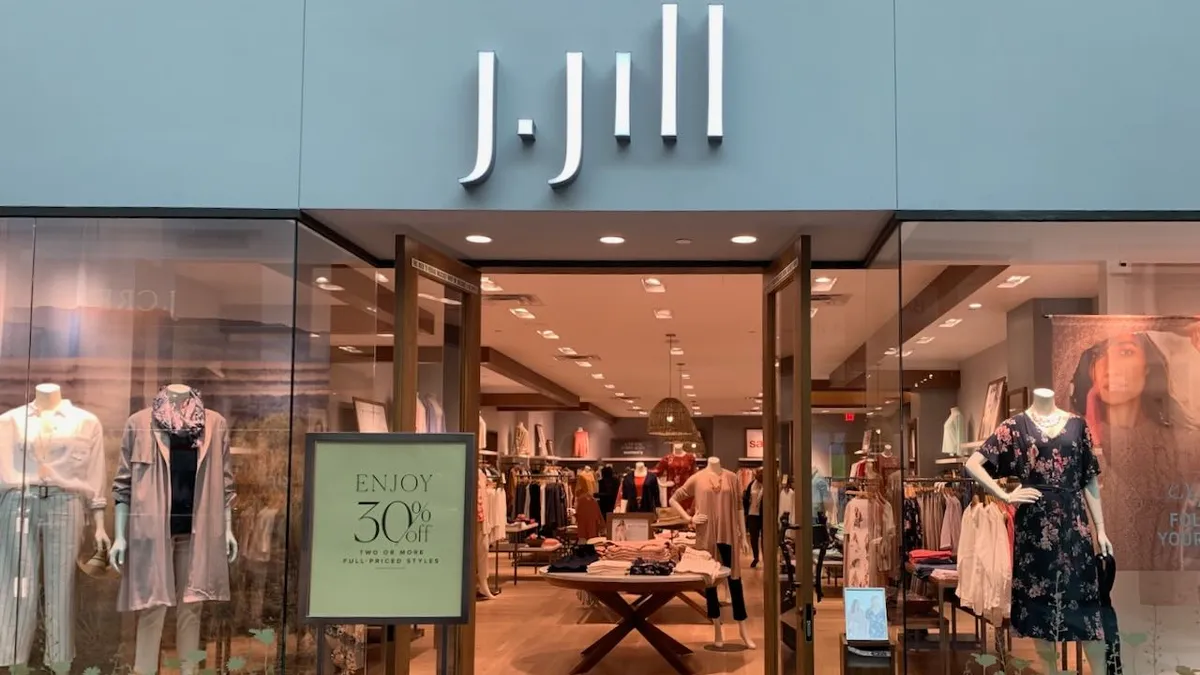UPDATE: July 16, 2020: J. Jill and its lenders have agreed to extend a forbearance agreement on its asset-based and term loan credit facilities. The original forbearance was set to expire Thursday and has now been moved to July 23, according to a press release.
"We remain engaged in productive discussions with our lenders, and today, our lenders extended the forbearance period under the existing forbearance agreements, which provides additional time for us to complete negotiations," J. Jill Interim CEO Jim Scully said in the release. "We are making progress with the negotiations and expect a resolution soon."
Dive Brief:
- J. Jill is in forbearance on its asset-based and term loans after breaching a covenant related to its total leverage ratio and issuing a going concern warning in its 10-K, the company said in a securities filing and press release.
- Under the forbearance agreements, J. Jill's lenders won't exercise any rights or remedies available under the original loan terms until July 16 so long as the retailer remains otherwise in compliance with its credit facilities and the terms of the forbearance.
- The disclosure comes after J. Jill said in its annual report that the company might not survive as a going concern. In the filing, the company said that the going concern warning constituted a covenant breach with lenders that could result in bankruptcy should lenders demand payment for outstanding commitments.
Dive Insight:
After closing all its stores in March, J. Jill has reopened about 85% of its stores with "enhanced" health and safety protocols. Interim CEO Jim Scully said that the company was able to keep serving its customers thanks to its direct channel, which accounts for about 45% of its business. Results where its stores have reopened "have exceeded our expectations," Scully noted.
But the closures took their toll, starving of sales a retailer already struggling. In response, the company furloughed employees, cut executive pay, eliminated a catalog, drew down $33 million from its ABL facility, extended payment terms with vendors and withheld $12 million in rent payments to landlords.
The company said in its 10-K that "uncertainty created by recent events generate scenarios that raise substantial doubt about our ability to continue as a going concern within one year."
For now, CFO Mark Webb said in a statement that J. Jill "has strong liquidity to meet its financial obligations reflected by our cash balances at the end of May and appreciates the partnership of its vendors and suppliers." (The company had around $60 million in cash at the end of May.)
While J. Jill acknowledged that breaching its loan terms could ultimately force it to file for bankruptcy, the agreement it struck with lenders buys it at least a month's time. The forbearance "will allow us to continue to work with our lenders on a course of action that will resolve the Company's noncompliance and position the Company to realize its long term plans," Scully said. "We appreciate the patience and support of our associates, vendors and suppliers."
J. Jill had problems going into the pandemic. Comparable sales fell 3.6% last year, and the retailer racked up a $128.6 million net loss for 2019, compared to a $30.5 million profit the year before, a figure that also represented a decline from the prior year. In May, S&P downgraded J. Jill deep into junk territory, slapping a CCC- rating on it and citing "very dim turnaround prospects" for the apparel retailer given the pandemic disruption and resulting economic downturn.
Multiple outlets reported last month that J. Jill has brought on advisers to help with its balance sheet woes. Among them was the law firm Kirkland & Ellis, which has served as counsel to numerous high profile retailers to file for bankruptcy.
"J.Jill is among several apparel retailers that came into the coronavirus disruption already contending with their own turnarounds and competitive pressure," Raya Sokolyanska, a vice president with Moody's, said in emailed comments Monday. "The EBITDA losses and liquidity depletion from temporary store closures and widespread discounting has dealt another blow that is highly likely to spell debt restructuring or bankruptcy."
















